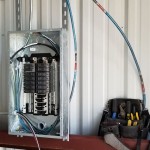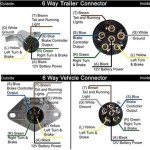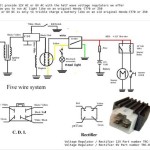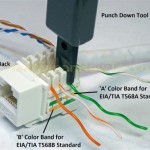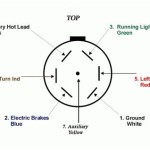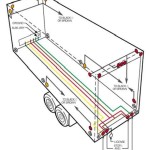Wiring A 7 Pin Trailer Plug entails connecting a 7-pin electrical connector to a tow vehicle and trailer, allowing the transmission of electrical signals for lighting, braking, and other functions. For example, ensuring brake lights and turn signals operate correctly when towing a trailer.
This process is crucial for safe and legal trailer operation. It ensures proper communication between the tow vehicle and trailer, enabling critical functions while minimizing electrical hazards. A key historical development was the standardization of 7-pin trailer plugs, facilitating compatibility and safety across different vehicle and trailer manufacturers.
Delving further, this article will provide detailed instructions on wiring a 7-pin trailer plug, highlighting its components, proper wire connections, and testing procedures. By understanding and correctly executing this process, you can ensure reliable electrical communication between your tow vehicle and trailer, promoting safe and efficient hauling.
When wiring a 7-pin trailer plug, meticulous attention to essential aspects is paramount for safe and effective electrical communication between the tow vehicle and trailer. These aspects encompass various dimensions, including:
- Pin Configuration
- Wire Gauge
- Color Coding
- Proper Connections
- Grounding
- Testing
- Safety Precautions
- Legal Compliance
- Troubleshooting
- Maintenance
Understanding these aspects ensures a comprehensive approach to wiring a 7-pin trailer plug. For instance, adhering to the correct wire gauge and color coding is crucial for proper signal transmission and circuit protection. Rigorous testing ensures reliable connections, while regular maintenance safeguards against potential electrical issues. Furthermore, awareness of safety precautions and legal compliance minimizes hazards and guarantees adherence to regulations. By considering these key aspects, you can confidently wire a 7-pin trailer plug, ensuring safe and efficient trailer operation.
Pin Configuration
Pin configuration is a critical aspect of wiring a 7-pin trailer plug, dictating the arrangement and functionality of each pin within the connector. Understanding the specific pin configuration ensures proper electrical communication between the tow vehicle and trailer.
-
Pin 1: Ground
Serves as a common ground connection for all circuits, providing a reference point for electrical signals.
-
Pin 2: Left Turn and Stop
Transmits signals for the left turn signal and brake light on the trailer.
-
Pin 3: Tail Lights
Powers the tail lights on the trailer, providing visibility during nighttime operation.
-
Pin 4: Right Turn and Stop
Similar to Pin 2, this pin carries signals for the right turn signal and brake light.
Correct pin configuration ensures that each electrical function operates as intended, preventing malfunctions or safety hazards. By adhering to industry standards and carefully aligning the pins during wiring, you can establish reliable electrical communication between the tow vehicle and trailer, ensuring safe and legal operation.
Wire Gauge
Wire gauge is a crucial aspect of wiring a 7-pin trailer plug, as it determines the thickness and current-carrying capacity of the wires used. Selecting the appropriate wire gauge ensures reliable electrical connections, prevents overheating, and minimizes voltage drop, thus ensuring optimal performance and safety.
-
Conductor Size
The diameter of the copper wire used in the trailer plug wiring. A larger conductor size indicates a thicker wire, allowing for higher current flow.
-
Current Capacity
The maximum amount of electrical current that a wire can safely carry without overheating. Proper wire gauge selection ensures adequate current flow for the intended application.
-
Voltage Drop
The reduction in voltage that occurs as electricity flows through a wire. Using a thicker wire (larger gauge) minimizes voltage drop, ensuring sufficient voltage reaches the trailer’s electrical components.
-
Insulation Thickness
The thickness of the insulating material surrounding the wire. Adequate insulation prevents electrical shorts and ensures safe operation in various environmental conditions.
Understanding and adhering to the appropriate wire gauge specifications are essential for reliable and safe wiring of a 7-pin trailer plug. By selecting the correct wire gauge based on the current requirements of the trailer’s electrical system, you can ensure optimal performance, prevent electrical hazards, and maintain compliance with industry standards.
Color Coding
In the context of “Wiring A 7 Pin Trailer Plug”, color coding plays a pivotal role in ensuring proper electrical connections and minimizing the risk of errors. Adhering to standardized color codes facilitates quick identification of wire functions, simplifies troubleshooting, and enhances overall safety.
-
Industry Standards
Color coding follows established industry standards, ensuring uniformity across different manufacturers and regions. This standardization enables technicians to easily identify wire functions, regardless of the specific trailer or tow vehicle.
-
Wire Identification
Each wire in a 7-pin trailer plug is assigned a specific color code, making it easy to distinguish between different functions. This color coding simplifies the wiring process and reduces the likelihood of incorrect connections.
-
Functional Grouping
Color coding often groups wires based on their functionality. For instance, wires related to lighting (tail lights, turn signals) may share similar colors, aiding in quick identification during installation or repairs.
-
Safety Implications
Correct color coding is crucial for safety. Mismatched wire connections can lead to electrical malfunctions, such as inoperative lights or even electrical fires. Adhering to color codes minimizes these risks and promotes safe trailer operation.
In summary, color coding in the context of “Wiring A 7 Pin Trailer Plug” serves as a universal language, simplifying wire identification, ensuring proper connections, and enhancing overall safety. By understanding and adhering to established color codes, individuals can confidently and efficiently wire 7-pin trailer plugs, promoting reliable electrical communication between tow vehicles and trailers.
Proper Connections
In the context of “Wiring A 7 Pin Trailer Plug”, proper connections are paramount, ensuring reliable electrical communication between the tow vehicle and the trailer. Meticulous attention to various aspects of connection quality is crucial for safe and effective trailer operation.
-
Secure Connections
Establishing mechanically secure connections between wires and terminals is essential to prevent loose connections, arcing, and potential electrical failures. Proper crimping, soldering, or utilizing self-locking connectors ensures lasting and reliable connections.
-
Correct Pin Alignment
Accurately aligning the pins within the 7-pin connector is vital for proper electrical contact. Misaligned pins can lead to intermittent connections, reduced current flow, or even damage to the plug or socket.
-
Clean Surfaces
Ensuring clean, corrosion-free surfaces on all electrical contacts is crucial. Dirt, debris, or corrosion can impede current flow and cause connection issues. Cleaning contacts with a suitable contact cleaner or abrasive material prior to connection is recommended.
-
Strain Relief
Providing adequate strain relief at the point where wires enter the connector prevents excessive bending or pulling forces from damaging the wires or connections. Strain relief devices, such as cable clamps or tie wraps, secure the wires and minimize stress on the connections.
By adhering to proper connection practices, individuals can ensure reliable electrical communication between the tow vehicle and the trailer, reducing the risk of electrical problems, ensuring safe and legal trailer operation.
Grounding
Grounding plays a crucial role in “Wiring A 7 Pin Trailer Plug” by establishing a common reference point for electrical circuits, ensuring proper functioning and safety. Without proper grounding, electrical systems can malfunction or pose safety hazards due to improper current flow.
In the context of a 7-pin trailer plug, the ground pin (typically Pin 1) provides the electrical connection to the trailer’s frame, which serves as the common ground for all electrical components. This connection allows for the completion of electrical circuits, enabling the proper operation of lights, brakes, and other electrical accessories on the trailer.
A real-life example of grounding in “Wiring A 7 Pin Trailer Plug” is the connection between the trailer’s frame and the tow vehicle’s chassis. This connection provides a low-resistance path for electrical current to flow, ensuring that all electrical components on the trailer have a common reference point. Without this proper grounding, electrical issues such as flickering lights, intermittent brake signals, or even electrical fires could occur.
Understanding the importance of grounding in “Wiring A 7 Pin Trailer Plug” is essential for ensuring the safe and reliable operation of trailers. Proper grounding practices, such as using high-quality ground wires and ensuring clean and secure connections, can prevent electrical problems and contribute to the overall safety and functionality of the trailer.
Testing
Testing is an integral part of “Wiring a 7 Pin Trailer Plug” as it ensures the proper functionality, safety, and reliability of the electrical connection between the tow vehicle and the trailer. Without thorough testing, electrical issues may remain undetected, leading to potential hazards or operational problems.
A critical component of “Wiring a 7 Pin Trailer Plug”, testing involves verifying the continuity of electrical circuits, ensuring proper voltage and current flow, and checking for any faults or shorts. This process helps identify any potential issues before connecting the trailer to the tow vehicle, minimizing the risk of electrical malfunctions or safety concerns.
Real-life examples of testing within “Wiring a 7 Pin Trailer Plug” include using a multimeter to measure voltage and continuity, checking the functionality of lights and brakes, and verifying the proper operation of turn signals. By conducting these tests, individuals can ensure that the electrical connection is established correctly and that all components are working as intended.
Understanding the connection between “Testing” and “Wiring a 7 Pin Trailer Plug” is essential for ensuring the safe and reliable operation of trailers. Proper testing practices can prevent electrical problems, ensure compliance with safety regulations, and contribute to the overall functionality and longevity of the trailer. By incorporating thorough testing into the wiring process, individuals can gain confidence in the electrical connection, promoting safe and worry-free towing experiences.
Safety Precautions
Within the context of “Wiring A 7 Pin Trailer Plug”, safety precautions play a paramount role, acting as a cornerstone for ensuring the electrical system’s integrity, reliability, and operational safety. Without adhering to proper safety measures, individuals may inadvertently introduce hazards or compromise the overall functionality of the electrical connection.
The significance of safety precautions in “Wiring A 7 Pin Trailer Plug” stems from the potential electrical hazards associated with improper wiring practices. Electrical faults, short circuits, or inadequate grounding can lead to severe consequences, including electrical fires, component damage, or even personal injury. By observing safety guidelines and employing proper techniques, individuals can mitigate these risks, ensuring a secure and reliable electrical connection.
Examples of safety precautions within “Wiring A 7 Pin Trailer Plug” include using appropriate gauge wires to handle the electrical load, utilizing high-quality connectors and terminals to prevent corrosion and ensure proper contact, and implementing proper grounding techniques to provide a safe path for electrical current. Additionally, wearing protective gear, such as gloves and safety glasses, can minimize the risk of electrical shock or eye injuries.
Understanding the connection between “Safety Precautions” and “Wiring A 7 Pin Trailer Plug” is crucial for ensuring the safety and proper functioning of the electrical system. By incorporating safety measures into the wiring process, individuals can prevent electrical hazards, ensure compliance with safety regulations, and contribute to the overall longevity and reliability of the trailer’s electrical system. Ultimately, prioritizing safety precautions promotes peace of mind and safeguards against potential risks, fostering a responsible approach to “Wiring A 7 Pin Trailer Plug” for both personal safety and the well-being of others.
Legal Compliance
Within the context of “Wiring A 7 Pin Trailer Plug”, legal compliance holds significant importance, establishing a framework for safe, reliable, and lawful operation of trailers. Failure to adhere to legal requirements can result in penalties, safety hazards, and compromised functionality of the trailer’s electrical system.
Legal compliance in “Wiring A 7 Pin Trailer Plug” primarily stems from regulations governing the proper functioning of vehicle lighting and signaling systems. These regulations vary across jurisdictions but share common objectives of enhancing road safety, preventing accidents, and ensuring the visibility of trailers during operation. By ensuring compliance with these regulations, individuals can contribute to safer roadways and minimize the risk of legal liabilities.
Examples of legal compliance within “Wiring A 7 Pin Trailer Plug” include using industry-standard color codes for wiring, adhering to specified wire gauges and insulation ratings, and proper installation of the 7-pin connector and socket. Moreover, periodic inspections and maintenance of the electrical system help maintain compliance and ensure continued safe operation.
Understanding the connection between “Legal Compliance” and “Wiring A 7 Pin Trailer Plug” is crucial for responsible and lawful trailer operation. By incorporating legal compliance into the wiring process, individuals can demonstrate their commitment to safety, comply with applicable regulations, and avoid potential legal consequences. Furthermore, promoting legal compliance fosters a culture of responsible driving and contributes to the overall safety and well-being of all road users.
Troubleshooting
Within the context of “Wiring A 7 Pin Trailer Plug”, troubleshooting plays a crucial role in ensuring the proper functioning, safety, and reliability of the electrical connection between the tow vehicle and the trailer. Without effective troubleshooting techniques, electrical issues may remain undetected, leading to potential hazards or operational problems.
-
Identifying Faulty Components
Troubleshooting involves identifying faulty components within the electrical system, such as damaged wires, loose connections, or malfunctioning lights. By using diagnostic tools and testing procedures, individuals can pinpoint the source of electrical problems and determine the appropriate repair or replacement actions.
-
Analyzing Electrical Signals
Analyzing electrical signals is a key aspect of troubleshooting, enabling individuals to assess the flow of electricity through the circuit. Using a multimeter or other diagnostic tools, technicians can measure voltage, current, and continuity, helping them identify any disruptions or abnormalities in the electrical system.
-
Inspecting Physical Connections
Thorough inspection of physical connections is essential for troubleshooting, as loose or corroded connections can cause intermittent electrical problems. By visually examining connectors, terminals, and wiring, individuals can identify potential issues and ensure secure electrical connections, preventing future malfunctions.
-
Testing Circuit Functionality
Testing circuit functionality involves simulating real-world conditions to assess the proper operation of the electrical system. This includes checking the functionality of lights, brakes, and turn signals, both individually and in combination, ensuring that all components are working as intended.
By incorporating effective troubleshooting techniques into the “Wiring A 7 Pin Trailer Plug” process, individuals can proactively identify and resolve electrical issues, minimizing downtime, enhancing safety, and ensuring a reliable electrical connection between the tow vehicle and the trailer. Troubleshooting promotes a proactive approach to electrical maintenance, empowering individuals to maintain and repair their trailer’s electrical system, contributing to its longevity and overall functionality.
Maintenance
Maintenance plays a pivotal role in ensuring the longevity, safety, and reliability of the electrical connection established through “Wiring A 7 Pin Trailer Plug”. Regular maintenance practices help prevent potential issues, mitigate wear and tear, and contribute to the overall functionality of the electrical system.
-
Inspecting Connections
Periodically inspecting electrical connections is crucial to identify any loose, corroded, or damaged components. Tightening loose connections, cleaning corrosion, and replacing damaged wires or connectors ensure optimal electrical flow and prevent potential hazards.
-
Checking Wire Insulation
Inspecting wire insulation for cracks, cuts, or abrasions is essential to prevent short circuits or electrical shocks. Damaged insulation should be repaired or replaced promptly to maintain the integrity of the electrical system.
-
Testing Circuit Functionality
Regularly testing the functionality of the electrical system, including lights, brakes, and turn signals, helps identify any malfunctioning components or intermittent issues. Proactive testing enables timely repairs, preventing unexpected failures during trailer operation.
-
Lubricating and Cleaning
Applying a dielectric grease to electrical connections and cleaning the 7-pin connector and socket can minimize corrosion, reduce wear and tear, and enhance overall electrical performance.
By incorporating these maintenance practices into the “Wiring A 7 Pin Trailer Plug” process, individuals can proactively maintain their trailer’s electrical system, prolonging its lifespan, enhancing safety, and ensuring reliable operation. Regular maintenance empowers individuals to take ownership of their trailer’s electrical well-being, fostering a culture of preventive care and contributing to the overall safety and functionality of trailers on the road.








Related Posts

